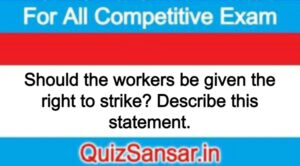
Should the workers be given the right to strike? Describe this statement.
Should the workers be given the right to strike? Describe this statement.
Ans.
In India the right to strike by employees has been recognised and is conceded by all. This is clear from the fact that the right to form associations or unions is guaranteed by the constitution. The International labor Organisation convention also protect such rights. However the right to strike cannot be said to be unfettered. In the Industrial Dispute Act, strikes have been declared illegal under certain circumstances and penalties have been provided for taking part in illegal strike, strikes and lockouts in public utility services will be illegal if declared without giving notice in a prescribed manner (6 weeks notice and within 14 days of the expiry of such notice) and all strikes and lockouts will be illegal if the matter involved is before the conciliation or adjudication proceedings, and after 7 days of conclusion of such conciliation proceeding and after 2 months of conclusion of a adjudication proceedings and also during any period in which a settlement or award in respect of the matters is in operation.
The National Commission on labor also observed “while we are not in favor of a ban on the right to strike or lockout, we are also not in favor of an unrestricted right to direct action. In our view, the right to strike is a democratic right, which cannot be taken away from the working class in a constitutional set up like ours. From the practical point of view, we will not favor such a step. Taking away the right of the workers to strike may only force the discontent to go underground and lead to other forms of protest which may be equally injurious to good labor-management relations. At the same time there are certain essential industries and services wherein a cessation of work may cause harm to the community. The economy or the security of the nation itself and as such, even this right may justifiably be abridged or restricted.” The commission further recommended that when such right is curtailed there must be simultaneous provisions of an effective alternative, like arbitration or adjudication to settle dispute.
There can be may circumstances when the right to strike has to be curbed. During emergency conditions, like that of a war or in case of public utility services, or even during the period of implementation of any plan for economic development of a country or when the parties adopt an unreasonable attitude it becomes the duty of the Government to interfere and take away the right to strike and make all dispute illegal.
While the right to strike may not be denied to the workers, that right should not be abused, may strikes are brought about sometimes on filmy grounds. Employer have sometimes to face very strange demands of the workers which are more psychological rather than economic or political in origin. Many strikes as we have seen, are brought about by political parties and outside leaders for their own interests without any reference to the interest of workers. The strike in the Premier Automobiles Bombay in 1958 was over a personal issue and not over any industrial question. Cases have also come to light when the employers have permitted the prolongation of disputes in order to win sympathy for themselves and strike at a labor by their own weapons. The strike in Bombay in the textile mills in 1950, which continued for 63 days and the recent strike in 1982 in Bombay Textile Mills prolonged which has continued for about 2 years can be cited as example. There is something in the psychology of the Indian workers which, while giving him patience and strength and courage to through. Acute suffering for weeks and even months seems nevertheless to produce a pronounced reaction from which he takes times to recover. The result have been that after every strike there is a period of calm and quite attitude on the part of workers, for a long time to come and this factor has induced many employers, who can afford to wait, to prolong strikes and also declare lockouts. Such an attitude of employers has to be depreciated. The strike is a three edged weapon. It is not only hit the employer but also the society, but the worst suffering in the process of usually the workers themselves and the distress caused to the laborer, on account of a strike, is in most cases out of all proportion to the gains ultimately secured. The workers sometimes have to face lathe charges and firing during a period of strike and they are victimized afterwards.






